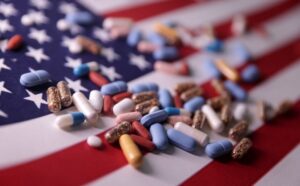The Uncertain Future of Pharmaceutical Stocks Amid Tariff Concerns
In recent developments, pharmaceutical stocks found a temporary shelter from President Trump’s sweeping tariff decisions. While drugmakers like AbbVie and Johnson & Johnson experienced a modest surge in their stock prices—gaining approximately 2%—the overall sentiment within the industry remains one of caution. Despite the reprieve for pharmaceutical products from immediate tariff concerns, analysts and executives agree: this is not the time to celebrate.
Current Tariff Landscape
Trump’s administration has imposed a 10% tariff on a broad swath of U.S. imports, with even steeper levies placed on a range of products from allies and rivals alike. However, key sectors including pharmaceuticals have momentarily avoided these tariffs, providing a much-needed respite for major exporters like India, Japan, and Ireland. The excitement, however, may be short-lived. A U.S. official recently indicated that targeted tariffs on the pharmaceutical sector could still be on the horizon.
During a press announcement in the White House Rose Garden, Trump specifically highlighted the pharmaceutical industry, stating his expectation that these companies would “roar back” to the U.S. market. He further threatened that any failure to do so could result in substantial tax penalties. This stark message underscores the administration’s focus on reshoring pharmaceutical manufacturing capabilities, which has significant implications for the industry.
The Shadow of Uncertainty
The atmosphere in the pharmaceutical sector is rife with concern. Analysts warn that the lingering uncertainty surrounding tariffs could overshadow any optimism stemming from the current reprieve. Emily Field from Barclays articulated this sentiment well: "The only thing that feels certain is more uncertainty." A representative from a European drugmaker succinctly summed up the industry’s apprehension: “It’s not today, but it’s coming.”
This cautious outlook is further compounded by the executive order listing pharmaceuticals alongside other industries like lumber and semiconductors for potential scrutiny under Section 232 of the 1962 U.S. Trade Act. As tariffs on critical supplies such as organic chemicals and glassware loom, Bernstein analysts estimate that the U.S. pharmaceutical sector faces an additional $45 billion in import cost risks.
Who Stands to Lose?
While certain companies like AbbVie and Merck are recognized for their substantial overseas manufacturing, analysts from Jefferies have flagged Biogen and Amgen as particularly vulnerable due to their significant exposure outside the U.S. The potential for rising manufacturing costs could significantly impact their profitability and operational efficiency.
Moreover, the medical device and diagnostics sectors are not exempted from these tariff tariffs, leading to noticeable stock declines in companies like General Electric Healthcare and DexCom, which dropped about 6% in response. According to industry trade group AdvaMed, these tariffs could stifle innovation, decreasing research and development spending and jeopardizing the U.S.’s position as a leader in the medical technology sector.
The Bigger Picture
At Extreme Investor Network, we understand that the pharmaceutical sector operates not only in a marketplace governed by financial variables but also one influenced by geopolitical factors. The ongoing trade wars and imminent tariff changes remind investors of the need for vigilance and adaptable strategies in their portfolios. Staying informed will be crucial in navigating this complex environment.
In conclusion, while the temporary exemption from tariffs sparks a glimmer of hope for pharmaceutical stocks, the storm clouds of uncertainty continue to gather. Investors would do well to keep a close watch on developments, as tomorrow’s reprieve could turn into next week’s setback. Stay tuned to Extreme Investor Network for continued insights and strategies to navigate these turbulent waters.

